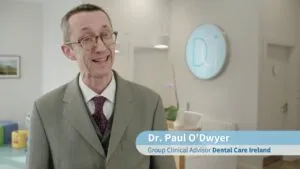Diabetes and oral health: the links
People with diabetes need to take good care of their oral health as they can be susceptible to various problems if their condition is not managed properly.
As the Diabetes Ireland Conference & Exhibition 2020 (DICE) begins today in Dublin, we look at the links between diabetes and oral health.
What is diabetes?
Diabetes is a condition that is caused by your body having insufficient insulin. Produced in the pancreas, insulin is a vital hormone that absorbs glucose (sugar) into your bloodstream which body cells then use for growth and energy. Diabetes is when your blood glucose (or blood sugar) is too high because your pancreas is not making enough insulin to enable all the sugar to be used.
What’s the difference between type 1 diabetes and type 2 diabetes?
Type 1 diabetes usually starts in childhood and people with the condition need to have injections of insulin. The cause of type 1 is due to the immune system destroying the cells in the pancreas that produce insulin.
Type 2 diabetes generally develops in adulthood and has often been linked to obesity and lack of exercise. It is a progressive condition and is usually treated with anti-diabetic medicine and/or insulin injections, as well as through diet changes and exercise.
Type 1 diabetes is also not preventable, whereas type 2 can be prevented with a healthy diet and effective weight management.
What is prediabetes?
This is when your blood glucose levels are too high but the condition has not yet caused diabetes proper. It is often an indication that type 2 diabetes will develop.
Is there a cure for diabetes?
Both type 1 and type 2 diabetes need to be treated in patients. For those with type 1, this involves daily management of insulin and to balance food intake or exercise, as well as insulin injections. Those with type 2 diabetes also need to control what they eat and exercise as well as taking medication. Many will also need to use insulin injections.
What are the risk factors for developing type 2 diabetes?
You are more likely to get type 2 diabetes if you:
- Are over 40
- Have family members with diabetes
- Are overweight
- Do not exercise regularly
- Have high blood pressure and/or high cholesterol.

How are dental health and diabetes linked?
People with diabetes often tend to develop issues such as gum disease, dry mouth, slow healing and infections. This is why it is important for people with the condition to really look after their dental health.
How does someone with diabetes keep their mouth healthy?
The following tips are important if you want to have good oral health:
- Monitor your blood glucose levels and take medication as required
- Brush teeth twice a day
- Floss your teeth every day
- Make sure you have a healthy diet
- See your dentist for frequent check-ups
- Do not smoke.
Diabetes and going to the dentist?
If you have diabetes, it is crucial that you let your dentist know as it will determine your treatment. He or she will also be able to advise you on how often you should have check-ups. Dentists also recommend that you eat a main meal before your appointment (as per the instructions of your medical team) and that you tell your dentist what medication, if any, you are on.
What oral health complications arise with diabetes?
These are the main issues that can arise if your diabetes is not being treated properly:
- Sore or swollen gums
- Bleeding gums
- Receding gums
- Loose teeth
- Bad breath.

What does Diabetes Ireland do?
Diabetes Ireland provides support, education and motivation to people living with diabetes. It also raises awareness of the conditions in the public domain as well as supporting research into it, its causes, treatments and cures. Its goal is to assist the thousands of Irish people who have diabetes, along with their families.
What is the Diabetes Ireland Conference & Exhibition 2020 (DICE)?
Every year, the charity organises various conferences at which national and international speakers convene to share knowledge and present papers on advances in the clinical treatment of diabetes. This year’s main event takes place on February 21st, 2020 in the Croke Park Conference Centre in Dublin. (Note: This event is for healthcare professionals only.)
To find out more about diabetes and oral health, check out the Diabetes Ireland website here: https://www.diabetes.ie/oralhealth/

This video featuring Dr Paul O’Dwyer, group clinical advisor with Dental Care Ireland, also has valuable information about dental care and living with diabetes.
You’ll find a list of all Dental Care Ireland practices nationwide, with full contact details, here.
Bad breath: how to prevent it
With Valentine’s Day around the corner, Dr Paul O’Dwyer, group clinical advisor at Dental Care Ireland, answers some common questions on how to keep bad breath at bay
Q: What is the most common cause of bad breath?
A: Bad breath (halitosis) can often originate in the gums and tongue. It is typically caused by the bacteria in our mouths as they work to naturally break down food. Smoking is also a common cause. In some cases, persistent bad breath can also be a sign of underlying issues such as tooth decay or gum disease.
Q: Is stress a contributing factor?
A: Stress, dieting, age, hormonal changes, and dry mouth can all exacerbate the symptoms.
Q: How can I help prevent bad breath?
A: It is important to maintain a consistent oral health routine at home. Ideally, brush twice per day for two minutes with a fluoride toothpaste. Remember to include your tongue, as it can also harbour bacteria. Floss teeth at least once a day, to help clean areas that your toothbrush cannot reach. It is best to replace your toothbrush at least every three months, or after an illness.
Q: How can I avoid it after eating my favourite foods?
A: Strong-smelling foods and drinks, such as onions, garlic or coffee, can be detected on a person’s breath for up to 72 hours after digestion. The effect on your breath is usually only temporary. Drinking plenty of water and chewing sugar-free gum after a meal, will increase saliva flow, which helps eliminate the odour-causing bacteria.
Q: How can I manage bad breath from smoking?
A: Mouthwashes and smokers’ toothpastes may be effective in removing stains and freshening up the mouth. While they can mask the symptoms/signs of halitosis, however, they cannot treat any underlying damage caused by smoking. Smoking also irritates the gums and often contributes to your chances of tooth decay and gum disease.
Q: What should I do if my bad breath persists?
A: If your bad breath persists, it could be a sign of underlying issues including tooth decay or gum disease. Schedule a regular check-up with your dentist or dental hygienist to help maintain your oral health and prevent the occurrence of bad breath.
For more tips and advice on looking after your family’s oral health, visit dentalcareireland.ie
Staff profile: Anne Francis is a hygienist in our dentist practice in Carlow
We sat down and talked to Anne about her passion for her work, the importance of good oral hygiene and why she loves working in our dentist practice in Carlow.
What does your role entail?
I am a Dental Hygienist. This means I will clean all the deposits and stains from patients’ teeth, scale away tartar build-up and then polish the teeth.
What do you most love about your job?
I love restoring the oral health of all my patients, both young and old.
Why did you choose to become a Dental Hygienist?
I wanted to be a Dental Hygienist because I want to help people look after their mouths.
Where did you study?
I studied in the Dublin Dental Hospital.
What advice would you give young people about entering dentistry as a career?
The advice I would give to young people entering dentistry as a career would be to expect that the job can be stressful at times, but it is very rewarding.
What piece of advice do you tend to give to all your patients?
The advice I would give to my patients is to attend the dentist regularly, that is very important.
What’s the best way to encourage children to keep their teeth strong and healthy?
A happy, healthy smile is better than a bad one is the advice I would give to encourage kids to keep their teeth healthy.
What should older patients do to look after their teeth?
Older people should ensure they attend the dentist regularly and get their teeth cleaned in order to keep their teeth healthy.
What are the most common problems you see?
The most common problems we see in the dentist practice in Carlow would be gum disease, tooth decay or poor diets.
And how do you advise patients to deal with them?
We stress the importance of a good diet and good dental hygiene.
What do you most like about working in Dental Care Ireland?
I love working in Dental Care Ireland as I love helping the patients. And the team here is great too!
How do you relax after work and on the weekends?
I relax after work and on the weekends by spending time with my family, reading and doing yoga.
If you hadn’t entered dentistry, what would your dream job have been?
If I hadn’t entered dentistry, my dream job would be a travel consultant.
Find out more about Dental Care Ireland in Carlow. To find the Dental Care Ireland practice nearest you, go here: https://www.dentalcareireland.ie/practices/
Don’t let bad breath ruin your love life this Valentine’s Day
As tradition would have it, a kiss on Valentine’s Day is said to bring good luck along with a variety of health benefits, including lowered blood pressure, and increased resilience against tooth decay, due to an increase in saliva which helps fight plaque causing bacteria.
However, there is one thing that is sure to stop you getting your kiss this Valentine’s Day, the dreaded curse of bad breath.
There are many common causes for bad breath or Halitosis and according to the Irish Dental Association, a surprising 1 in 4 Irish people are suffering with chronic bad breath. In most cases it is easily treated and very preventable and shouldn’t be holding you back from a potentially life changing kiss.
It is likely that your bad breath is caused by the bacteria in the mouth working to break down food in the mouth and leads to the formation of plaque on your teeth, tongue and gums. When combined with saliva, it can produce an unpleasant smelling gas.
Make sure you adopt a good oral hygiene routine, brushing alone will only clean 60% of the tooth surface. Flossing daily will allow to reach the surfaces that brushing misses and will limit the amount of bacteria in your mouth.
Just because you’re brushing your teeth twice a day, doesn’t mean you’re cleaning them well enough. You need to brush for a at least two minutes and be sure to change your toothbrush every 3-4 months. You may want to rinse with an antibacterial or odour eliminating mouthwash too.
Of course there are the obvious causes, don’t be surprised if people keep their distance after you’ve indulged in strong smelling foods such as onions and garlic. This smell is often temporary and following good oral hygiene techniques will help.
Smokers take note, this is a likely cause of your bad breath. As well as the lingering smell of stale smoke, it stains your teeth, irritates your gums and increases your chance of tooth decay and gum disease.
Constant bad breath can also be a sign of tooth decay or gum disease. You should be visiting your dentist every 6-12 months, so it may be time to book your check-up to make sure you have no cavities in need of attention.
Book your dental examination with one of our Dental Care Ireland clinicians today and make sure your teeth and gums are happy and healthy. Don’t let bad breath hold you back.

